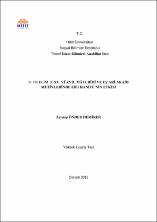H.IV-IX./M. X-XV. yüzyıl Mâturîdî ve Eş'arî Akaid metinlerinde Ebû Hanife'nin etkisi
Citation
Önder Demirer, Zeynep (2016). H.IV-IX./M. X-XV. yüzyıl Mâturîdî ve Eş'arî Akaid metinlerinde Ebû Hanife'nin etkisi (Yüksek Lisans Tezi)Abstract
Ebû Hanife'nin H. IV-IX./M. X-XV. yüzyıllar arasında Mâturîdî ve Eş'arî akaid metinlerindeki izlerinin araştırıldığı bu çalışma giriş ve üç bölümden oluşmaktadır. Amaç, önem, kapsam ve yöntem giriş bölümünde ele alınmıştır. Çalışmada Ebû Hanife'nin beş eseri merkeze alınarak zikredilen süreçte yazılan ve kendisine müracat edilmesi bakımından öne çıkmış akaid metinleri incelenmiştir. Bu inceleme ile Ebû Hanife'nin akaid geleneğindeki konumunun belirlenmesi amaçlanmıştır. Bunun tespiti ise Ebû Hanife'nin Ehl-i Sünnet akidesinin kurucu öznelerinden biri olduğunu göstermesi açısından önemlidir. Birinci bölümde Ebû Hanife'nin hayatı ve eserleri, Kelam/Akaid ilmindeki yeri ve beş eserinin ona aidiyeti meselesi ele alınmaktadır. İkinci bölümde, akaid metinlerinin biçimsel ve içeriksel yapısı değerlendirilmiştir. İlk olarak akaid kültürünün oluşum ve gelişim süreçleri aktarılmıştır. Metinlerin itikadî söylem yapısı analiz edilmiş, buna bağlı olarak da gramatik yapılarının tahliline yer verilmiştir. Bu söylemin önemli bir parçası olan ötekinin ve öz kimliğin tanımlanmasında müracat edilen kavramlar ve metinlerin beraberinde getirdiği yeni sentaks yapısı ortaya konmaya çalışılmıştır. Son olarak metinlerin yazım yöntemleri ile içerikte karşılaşılan nasların ve fıkhî hükümlerin kullanılması meselesi değerlendirilmiştir. Üçüncü bölümde, Ebû Hanife'nin beş eseri ve sınırlandırılan dönemde kendisine en çok müracat edilmesi bakımından tercih edilen Eş'arî ve Mâturîdî akaid metinlerinin içeriksel analizi yapılmıştır. Bu analiz, belirli konu başlıkları belirlenerek gerçekleştirilmiştir. Buna göre ele alınan başlıklar şunlardır: İman ve ilgili meseleler; imanın tanımı ve amel ile olan irtibatı, imanın artması ve eksilmesi, mukallidin imanı, iman ve islam, imanda istisna, insanın fiilleri, Allah'ın sıfatları, nübüvvet ve ilgili meseleler, kıyamet alametleri, ahiret ve ilgili meseleler, sahabeye hürmet ve imâmet. This study consists of an entrance and three chapters, in which Abu Hanifa's impressions in Maturidi and Ash'ari's texts of akaid/belief between the 10th and 15th centuries are searched. The entrance section adressed the purpose, importance, content and method of the current study. The rest of the study examined prominent texts, in terms of accesing to information, written in the aforementioned period by centering Abu Hanifa's five pieces. The purpose of the study was to determine the position of Abu Hanifa in akaid/belief tradition. This is critical because it shows that Abu Hanifa is one of the founders of Ahl al-Sunnah akaid/belief. The first chapter covered Abu Hanifa's life, books, his importance in Ilm al-Kalam, and, the issue regarding that, whether or not, aforementioned five books' belong to him. The second chapter adressed the structure of akaid/belief texts stylistically and contextually. First of all, the process of formation and devolopment in the akaid/belief culture was stated. Then, theological discourse structure of the texts was analyzed so that the analysis of gramatical structures came out. The concepts applied to describe the other, an important piece of this discourse, and self-identity, and the new syntax structure based on texts was tried to prove. Eventually, the writing methods of texts and the usage matter of revelations and the judgements of Islamic jurisprudence encountered in texts were evaluated. The third chapter addressed the contextual analysis of Abu Hanifa's five pieces and exclusive texts, in terms of accesing to information, in the aforementioned period of Ash'ari and Maturidi akaid/belief. This analysis was done by identifying spesific topics. Accordingly, the following topics are examined: The belief and relevant topics, the definition of belief and its connection with the deed, the increase and decrease in belief, the belief of an imitator, the belief and Islam, exception in the belief, deeds of a person, Allah's attributes, prophethood and related topics, signs of the doomsday, the hereafter and pertinent topics, the respect to companions and imamate.


















